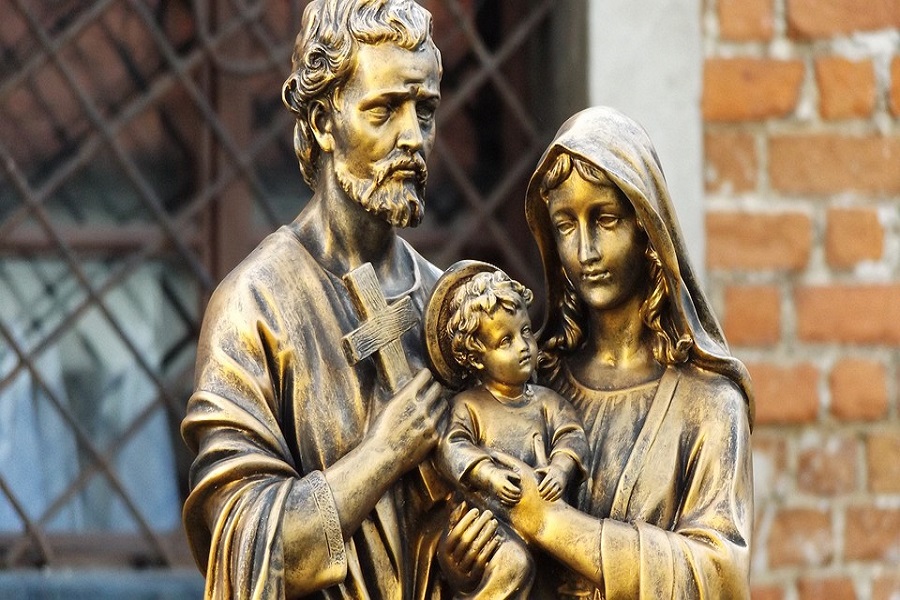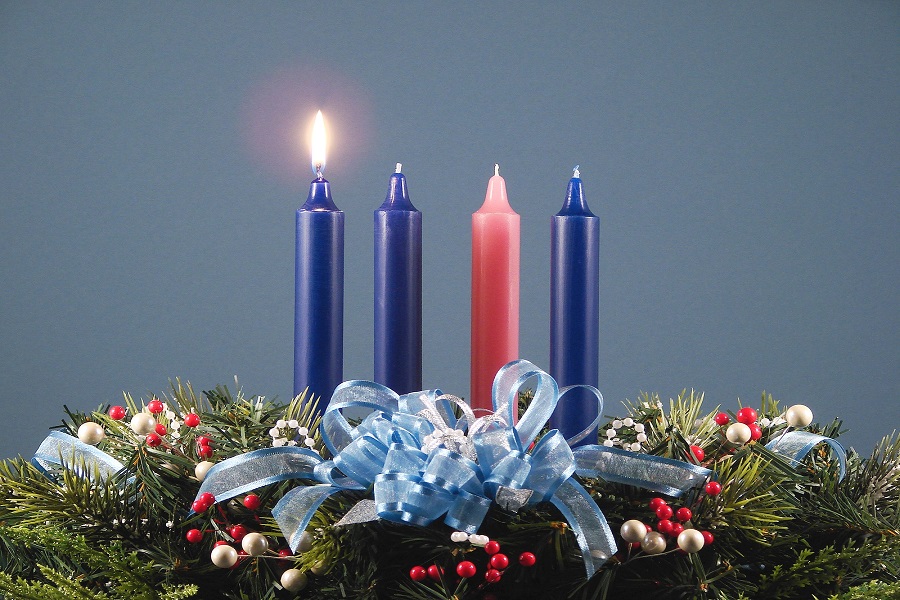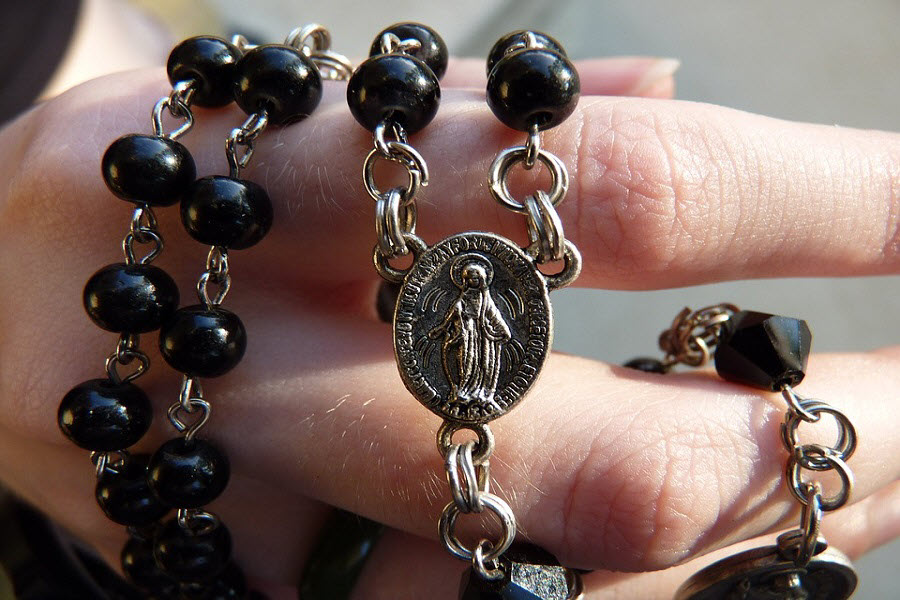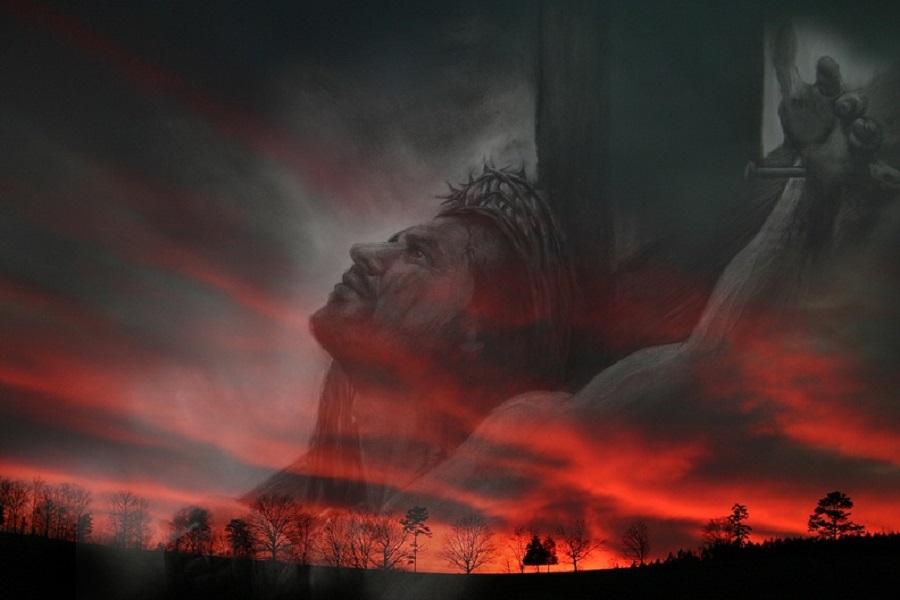
Bearers of the Word
12-31-2017Weekly ReflectionThe Church has placed a number of notable feast days immediately after Christmas. The feasts of Stephen, John the Evangelist, and the Holy Innocents form a summary of the life lived in Christ, the Word made flesh. What do these have to do with the feast of the Holy Family, which crowns the Octave of Christmas? These feasts remind us that suffering will occur in fulfilling the mission of Christ and that we are all called to be bearers of this Word whose birth we celebrate.
READ MORE
Point Us to the True Gift
12-24-2017Weekly ReflectionChildren of the parish are somewhat focused on Santa Claus these days, who is keeping an eye on who’s naughty and who’s nice. Santa Claus, with his heavenly patron Saint Nicholas, has been more or less in charge of gift-giving to American children for a hundred years or so.
READ MORE
Treasures from Our Tradition: A Presipio
12-17-2017Weekly ReflectionLast week, we looked at a form of nativity scene called a presipio, characterized by framing the crèche of Jesus with a vast array of personalities and a rich geographical context. The tradition was carried to the New World and finds very rich expression in Latin America today. While in Europe the presepio was reserved mostly to the homes of wealthy nobles and great churches, in Latin America it was claimed by the poor and expressed the skills of native artisans. In Mexico, you can still find clay figures in every village market. In a way, the native people took the religion of Spanish rule and baptized it with their Indian culture by surrounding the crib of Jesus with local geography and people. In Brazil, where Christmas falls in summer, the figure of the baby Jesus is wrapped in gold and gems, and set on a hillside surrounded by flowers and animals of all kinds. Sometimes there is a double presepio, presenting both Nativity and Crucifixion.
READ MORE
News of Comfort
12-10-2017Weekly ReflectionIn a time of preparation, much of it having to do with material things, it is good to hear the words of Isaiah, “Comfort, give comfort to my people, says your God” (Isaiah 40:1). In a time of such stress and rush, when our usual burdens are augmented by piles of Christmas preparations, we can choose to slow down, take some time to heal, and appreciate the enormous gift we are about to receive.
READ MORE
God Has a Different Plan
12-03-2017Weekly ReflectionWe begin the season of Advent with a heartfelt call for our own repentance. We remember God’s faithful love for us, and call upon God to help us to turn back. For “behold, you are angry, and we are sinful” (Isaiah 64:4). In the first reading and in the psalm, we recall God’s promises and lament our unfaithfulness and our guilt. We call upon God’s might and power in order to save us. With Isaiah, we ask God to “rend the heavens and come down, /with the mountains quaking before you” (Isaiah 63:19).
READ MORE
Christ, King of All
11-26-2017Weekly ReflectionOn this, the final Sunday of the liturgical year, we celebrate the solemnity of Christ the King. By concluding the year with this feast we are proclaiming our faith that Jesus Christ is the one and only king over all seasons, all peoples, and all of creation.
READ MORE
Sharing Our Gifts
11-19-2017Weekly ReflectionAutumn is the season for harvesting and sharing the fruits of our labors. This week’s scriptures use images of the harvest, family life, pregnancy, and investment to describe the abundant harvest in the reign of God. We discover that sharing the gifts we have been given brings eternal rewards for everyone.
READ MOREOur Treasury of Prayer
11-12-2017Treasures from our TraditionWe had sixteen hundred years’ experience with one Eucharistic Prayer in our repertoire and the liturgical reforms of the Council of Trent shaped the way we worshiped for four hundred years. In the last years of the Tridentine Mass, the early 1960s, we tended to see children as miniature adults. Fully rooted in the Sunday assembly by the decision of Pope Saint Pius X to push Communion back to the age of seven or so from the standard age of twelve to fourteen years during the early 1900s, children were still more tolerated than acknowledged. The Mass was in Latin, and by the 1960s the people had begun to regain their voices in the “dialogue Mass,” so the focus was on training little children to recite or sing in Latin.
READ MORE
The Psalter of Mary
11-05-2017Weekly ReflectionSuch is an old name for the Rosary because of its fifteen decades-150 Hail Mary’s with fifteen meditations-is a complete Rosary and includes exactly the same number of Hail Mary’s as there are psalms in the Psalter (Book of Psalms). It was the laity’s desire to share in the Church’s daily prayer, the Liturgy of the Hours, that led in the twelfth century to the Rosary prayer form.
In those days, many of the faithful were unable to read, so praying the Aves from memory took the place of the written prayer texts used by the more educated clergy. The well known and symbolically powerful beads were adopted as a simple counting aid. Such are the scriptural and liturgical roots of this symbol of prayer, the Rosary.

Balance
10-29-2017Weekly ReflectionToday’s scriptures emphasize the fundamental link between love of God and love of our neighbors, especially those who are most in need. Love of God should compel us to love the people whom God cherishes. Conversely, work for justice and charity for those in need should be rooted in our love of God.
That connection and balance, however, isn’t always easy to maintain in our lives. Even in religious orders, we find that some Christians are more oriented toward contemplation and prayer, while others are more active in reaching out to those who are oppressed. Today Jesus reminds us of the necessity for both in the life of faith.

Power Struggle
10-22-2017Weekly ReflectionPower struggles occur on every level of society from the world stage to relationships at work, to our own homes. We struggle for position in the hierarchy of power. Who has power over whom? How do they wield it? What is the source of that power? What is the healthy response?
In this Sunday’s Gospel reading the Pharisees engage Jesus in a power struggle over whether Jews should show tribute to Caesar by paying taxes. Jesus’ response puts this and every struggle for power into perspective. In harmony with the words of Isaiah and Paul, Jesus teaches us that God is the ultimate source of all power—the power of earthly rulers, the Pharisees, Jesus, the Church, and the power within ourselves.

The Heavenly Banquet
10-15-2017Weekly ReflectionThe mountain of the Lord described in today’s first reading is a place where there is no more hunger, no more weeping, and no more division of any kind. We need to pause and ponder these images every now and then, especially given the fact that we live in such a fractured world.
The responsorial psalm continues to paint a picture of a place where only goodness and kindness flourish. These readings describe the heavenly banquet, to which God calls each of us through baptism and continues to call us throughout our lives. Let us “RSVP” to God’s invitation and live our lives consistent with gospel values so that one day we will be welcomed to the table of the kingdom.

Bearing the Right Kind of Fruit
10-08-2017Weekly ReflectionToday’s readings focus our attention on vineyards. Isaiah’s song concerning his friend’s vineyard begins with inspiring and poetic images of an idyllic vineyard where the choicest harvest is expected. Instead, the vineyard yields wild grapes, which causes the owner to abandon it.
READ MORE
God's Ways
10-01-2017Weekly ReflectionIn the stream of readings during this portion of Ordinary Time one week’s texts can often appear to pick up exactly where the previous week’s concluded. The sentiments expressed in today’s first reading seem to be a direct reaction to the Gospel passage we heard last week. In that Gospel, the landowner pays the same wages to his workers whether they worked for a full day or for only a few minutes. Today Ezekiel gives us the lament, “The LORD’s way is not fair!” (Ezekiel 18:25). These Sundays in Ordinary Time offer us a glimpse into the ways of the Lord. We see how God’s way has the tendency to turn the accepted conventions of the day upside down. Those who always expected that their way to heaven was guaranteed are disappointed. Those who thought they never had a chance are given that chance. Today offers us another opportunity to discover the abundance of God’s mercy and love.
Treasures from Our Tradition
10-01-2017Treasures from our TraditionEucharistic Prayer IV is, like Eucharistic Prayer III, a fresh composition from the 1960s, based on a prayer from the tradition of the ancient church of Alexandria. It has an interesting structural feature. The new prayers all nod toward the East with the epiclesis, or calling down of the Spirit, over the gifts. In this prayer the Spirit is asked to come down again, after the consecration, to make holy the communicants who “partake of this one Bread and one Chalice that, gathered into one body by the Holy Spirit, they may truly become a living sacrifice in Christ to the praise of your glory.” This beautiful phrase is well worth meditating on. What is the goal of your reception of Holy Communion today?
The preface for this Eucharistic Prayer is firmly attached to the prayer and the directives for using the prayer anchor it to Ordinary Time. It is not intended to be an option if the Mass has a proper preface of its own, like a funeral, a Lenten weekday, or a great feast. It is not often used these days, in part because of these limitations. At first, it was suggested that this prayer was better suited to small groups of people who were well educated in scripture. This was kind of an odd stipulation, especially since its images are so beautiful and worthy of attention.